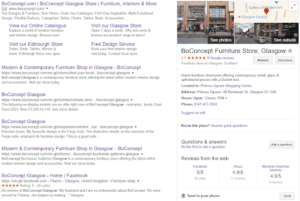What are the best review platforms in the UK?
Update: Due to changes by Google in 2020, you will now only be able to have star ratings in search engine results for individual product pages. If you have individual product pages, these should have product page schema markup applied to them to allow Google to read them as such. Scroll to the bottom of the post for more details on how to implement this!
Review platforms, when used and optimised correctly, have a huge influence in providing traffic and conversions to your brand.
A good review (or, even better, many good reviews!) acts as a stamp of approval for a company’s service or product, telling potential customers that the product is one to purchase. This is crucial for online retailers as a validation of the product or service – particularly when optimising appearances in the SERPs (search engine results pages).
Just how much of an influence will reviews have on the customer? A study from Podium and published in The Drum found that 93% of customers say online reviews impact their purchasing decision, making it crucial for a company to engage with online review platforms.
Going beyond the customer influence that reviews have and looking at the SEO implications for reviews, we need to look at how Google uses them, what platforms to focus on and what impact these have.
The impact that reviews have on customers being driven to your business’s website is shown in a study carried out by Richard Baxter, measuring click through rates. The test found that the meta description with a review-rich snippet included (ie. with stars shown in the description) had a click through rate of 26.32%, while the other descriptions tested (with sales-driven wording and informative wording) had click through rates of 21.52% and 14.93% respectively.
So reviews in your brands search results are needed. Here’s how to go about it.
List of Google associated review sites:
The platforms to be aware of when choosing an integrated review platform are those that have relationships with Google. These are sites that act as ‘sources of feedback’ to Google in determining reviews and, in turn, SERP rankings for your business:
- Ausgezeichnet.org
- Bazaarvoice
- Bizrate
- eKomi
- E-Komerco
- ECã ã
- Feedback Company
- Feefo
- FIA-NET
- Hardware.info
- Heureka.cz
- KiyOh
- Klantenvertellen
- kuchikomiking.jp
- osaifu.com
- Poulpeo
- PowerReviews
- ProductReview.com.au
- ResellerRatings
- Reviews.co.uk
- Reevoo
- Shopper Approved
- ShopVote.de
- ShopAuskunft
- StellaConnect
- TrustedCompany
- Trusted Shops
- TrustPilot
- Verified Reviews
- Yopi.de
- Yotpo
- Zoorate
Of course, the review sites that you’re looking to concentrate efforts on maintaining from the above list will be those that are in the territories in which your business operates. Taking the UK sites from the Google associated list, we are left with the below:
- bazaarvoice.com/uk/
- bizrate.co.uk/
- feefo.com/
- reviews.co.uk/
- reevoo.com/en/
- trustedshops.eu/
- trustpilot.com
- verified-reviews.co.uk/
Positive reviews are a large factor that contributes to the health of a Google My Business profile and search visibility for a locally-focused business. While Google will take signals from the above review sites as indicators for SERP position and rating, a business should not ignore engaging with Google reviews, social media reviews such as Facebook and independent review platforms.
Take furniture store BoConcept as an example. Within the SERP listing for a branded search for ‘BoConcept Glasgow’ there are three points on the page dedicated to rating the business. One within the results as a rich snippet from Facebook’s reviews, and two sections within the Google My Business profile – Google reviews at the top and rankings from independent review platforms that Google has pulled; Facebook, Houzz, and Maclaren Electrical Services (which, incidentally, seems to be a mistakenly associated with BoConcept).
Anyone who was to search for this shop would have their eyeline drawn to each of these, influencing their immediate impression of the store, even before visiting the website.
Besides Google reviews and Facebook, which will be standards for most businesses to encourage customer reviews on, Houzz is a more tailored result for the homeware and furniture niche that BoConcept sits in. Be aware of similar platforms which cater to the specific niche of your business, as Google will likely know this and provide its listing as a variation from the standards.

What are the best review platforms for SEO?
In a post on the SEM Rush blog written by Jason Barnard, the top review sites for SEO visibility were highlighted measuring the number of keywords that the platform ranks for, the traffic this generates to the site and their SEO rank (SEM Rush measure)

The research found Trustpilot to be the top review platform if you want to increase visibility of your brand on a website where your customers can leave reviews. Each of these review sites are associated with Google, so while Trustpilot harbours the most visibility for SEO, being listed on each of the platforms and gaining reviews on each will be recognised by Google and pulled into your Google My Business profile.
Using reviews for eCommerce product page optimisation
For an eCommerce site, reviews for individual product pages can also be pulled through to appear on their listings on the search engine results page. This is a great way to help your page stand out from competitors in the organic search results.
The below example shows the product listing of robin food from the garden wildlife supply company, Ark Wildlife. As you can see, the review star rating has been pulled into the Google listing alongside other product information. Great for catching the eye and showing off good reviews!

To do this you’ll need two things –
- To feature one of the above review platforms on the product page – this should ideally be one platform across all of your products
- Product schema markup – this tells Google that the page is a product page, so it will treat it as such in the Google search results
Google Search Central has detailed information on their ‘Product’ page guide if you want to learn more about optimising your product pages with schema markup. If you’re interested in implementing this across your site and don’t know where to start, feel free to call us at Distinctly!



